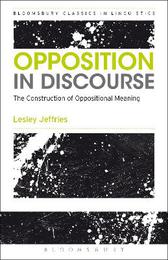
|
Opposition In Discourse: The Construction of Oppositional Meaning
Paperback / softback
Main Details
| Title |
Opposition In Discourse: The Construction of Oppositional Meaning
|
| Authors and Contributors |
By (author) Dr Lesley Jeffries
|
| Series | Bloomsbury Classics in Linguistics |
|---|
| Physical Properties |
| Format:Paperback / softback | | Pages:160 | | Dimensions(mm): Height 216,Width 138 |
|
| Category/Genre | Semantics |
|---|
| ISBN/Barcode |
9781472528384
|
| Classifications | Dewey:401.41 |
|---|
| Audience | | Tertiary Education (US: College) | | Professional & Vocational | |
|---|
|
Publishing Details |
| Publisher |
Bloomsbury Publishing PLC
|
| Imprint |
Bloomsbury Academic
|
| Publication Date |
31 July 2014 |
| Publication Country |
United Kingdom
|
Description
In this important book, Lesley Jeffries introduces a phenomenon which has not been given the attention it deserves - the contextual construction of oppositional meaning. These are opposites not recognisable as such out of context but that are clearly set up this way in the text concerned. The significance of oppositional meaning is well-known but the main emphasis has always been on the conventional opposite: the opposite recognised by lexical semantics. Starting from socio-cultural viewpoints, moving to original research and then concluding with a new theoretical formulation, this book introduces and consolidates a significant new approach to the analysis of oppositional meaning. It closes with a discussion of the importance of constructed opposition in hegemonic practice and makes a case for the inclusion of opposition as a central tool of critical discourse analysis. It is essential reading for those in stylistics, linguistics and language studies.
Author Biography
Professor Lesley Jeffries is Chair of English Language and Director of the Stylistics Research Centre at the University of Huddersfield, UK. She is also Chair of the Poetics and Linguistics Association (PALA) from 2007-10.
ReviewsThe focus of this book is on how 'created' oppositions are triggered, constructed and construed in language. Examples are drawn from a wealth of sources - including poems, medical texts and newspaper stories - with oppositions cleverly unravelled and their ability to influence our thoughts and our reality gradually exposed. The findings contribute usefully to the growing body of knowledge about antonyms and other oppositions, and to the contexts in which they occur; the ramifications are significant for language-based studies of literature, popular culture and the media. -- Steven Jones, Director of Undergraduate Studies, School of Education, The University of Manchester, UK [Jeffries'] analysis of a range of constructed opposites from literary and non-literary texts adds importantly to our understanding of this language device that is one technique being used to construct a worldview of opposites, of them and us. -- Helen de Silva Joyce, University of Technology, Sydney, Australia * Discourse & Communication *
|